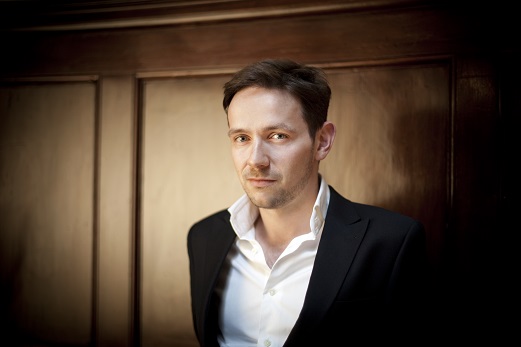 United Kingdom ‘Sound the Trumpet’ – Music by Purcell, Blow, Humfrey, and Williams: Iestyn Davies (countertenor), James Hall (countertenor), The King’s Consort (Rebecca Miles [recorder], Ian Wilson [recorder], Reiko Ichise [bass viol], Lynda Sayce [theorbo], Robert King [harpsichord and chamber organ]). Wigmore Hall, London, 4.1.2019. (CSa)
United Kingdom ‘Sound the Trumpet’ – Music by Purcell, Blow, Humfrey, and Williams: Iestyn Davies (countertenor), James Hall (countertenor), The King’s Consort (Rebecca Miles [recorder], Ian Wilson [recorder], Reiko Ichise [bass viol], Lynda Sayce [theorbo], Robert King [harpsichord and chamber organ]). Wigmore Hall, London, 4.1.2019. (CSa)

Henry Purcell – ‘Sound the trumpet’; ‘In vain the am’rous flute’; ‘O solitude, my sweetest choice’; ‘No, resistance is but vain’; Chaconne from Dioclesian; ‘Sing, sing ye druids’; ‘Since from my dear Astra’s sight’; ‘O dive custos Auriacae’
John Blow – ‘Ah heav’n, what is’t I hear?’; ‘Paratum cor meum’; ‘An Ode on the Death of Mr Henry Purcell’
Pelham Humfrey – ‘Lord, I have sinned’; ‘A hymn to God the Father’
William Williams – Sonata in Imitation of Birds
‘Music and poetry have ever been acknowledged Sisters, which walking hand-in-hand, support each other … Both may excel apart, but sure they are most excellent when they are joined, because nothing is then wanting to either of their perfections’ wrote Henry Purcell in an introduction to his opera King Arthur. In a perfect fusion of these two art forms at London’s Wigmore Hall, countertenors Iestyn Davies and James Hall, supported by a small group of players from the King’s Consort under the direction of their founder Robert King, presented a fine selection of Restoration poems and texts, set to music by the great Purcell and his lessor known teachers, John Blow and Pelham Humfrey.
The two solo singers were for the most part well matched, although in terms of projection, phrasing and dramatic intensity, Iestyn Davies had the upper hand. James Hall, his voice the higher of the two, introduced a chorister’s crystalline purity, which complemented Iestyn Davies’ deeper, rounded tone.
The evening started with a spirited performance of ‘Sound the Trumpet’ – from Come Ye Sons of Art written for the widowed Queen Mary, and performed here in Purcell’s original version – without trumpets. There was nonetheless more than a hint of trumpets in the joyous and elegantly ornamented exchanges between the two singers as, musically speaking, they advanced and parried with the agility of fencers.
Next came the sensuous and melancholy setting of Nicholas Brady’s ‘In vain the am’rous flute’, a duet from Purcell’s largest scale ode Hail Bright Cecilia. Here, the voices – sinuously intertwined and perfectly balanced – vividly evoked the poet’s struggle to supress ‘wanton heat and loose desire’ in favour of ‘heav’nly love’. In a languidly beautiful account of ‘O solitude, my sweetest choice’, Iestyn Davies gave us a masterclass in breath control and phrasing, effortlessly floating the complex melody over a repeated ground bass delicately played here by Reiko Ichise on bass viol and Lynda Sayce on theorbo. In an operatic and superbly synchronised account of the duet in ‘No, resistance is but vain’, Cupid’s tyranny was emphasised by Davies with panache in a series of pyrotechnical vocal runs on the line ‘The fierce with fierceness he destroys.’
The ethereal Chaconne from Act III of Purcell’s opera Dioclesian provided a delightful instrumental interlude followed seamlessly by a finely balanced account of John Blow’s ‘Ah heav’n, what is’t I hear?’
The first half of the concert concluded with Purcell’s poignant setting of Henry Parker’s elegy ‘O dive custos Auriacae’, written in response to an outpouring of national grief following the death of Queen Mary in December 1694. The solemn and soaring beauty of the music, and the glorious interweaving of these two magnificent voices, combined to capture the text’s mournful reference to the dreaming spires of Oxford and Cambridge and the rivers running slowly through them.
After the interval, the programme took a devotional turn, with Blow’s setting of Psalm 107 ‘Paratum cor meum’ (My heart is ready) and Pelham Humfrey’s ‘Lord I have sinned’ and ‘A hymn to God the Father’ – the latter set to one of John Donne’s Divine Poems. These were wonderfully sung, but in Wigmore Hall’s auditorium, somehow lacked the spiritual resonance which a church performance might have provided. After another enchanting instrumental interlude – Sonata in Imitation of Birds by William Williams – the formal programme concluded fittingly with a gracefully sung duet – Blow’s setting of Dryden’s ‘An Ode on the Death of Mr Henry Purcell’. An appreciative audience was rewarded with a full ensemble encore, the jolly ‘Hark, how the songsters of the grove’ from Purcell’s semi-opera Timon of Athens.
Purcell died in 1695. He was only 36 years old, yet, as this excellent concert demonstrated, his towering genius and rich legacy live on.
Chris Sallon

After attending the concert myself, I find it such a shame that you have placed so much emphasis on one singer over the other. One may be more recognisable, but in terms of contribution to the performance, they were equally matched.
Thank you for your comment to S&H but in the second paragraph both singers receive due praise. S&H